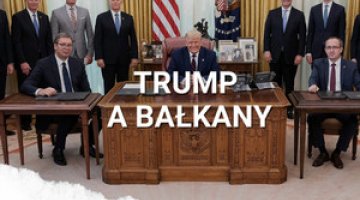Serbia: a government of nationalists with European ambitions
On 27th July the Serbian parliament approved the composition and programme of the new government led by Ivica Dacic with the votes of 142 members (out of 250). The main party in the coalition is the left-wing Serbian Progressive Party (SNS) which derives from nationalist circles; its candidate Tomislav Nikolic was elected president in May this year. The government was also formed from the post-Milosevic Socialist Party of Serbia (SPS), the liberal United Regions of Serbia (URS) and parties representing national minorities.
The government has announced an ambitious plan to support economic development but at the same time has ruled out drastic austerity measures. As regards foreign policy, the new government wishes to continue the policy of its predecessor: strengthening integration with the EU and launching accession negotiations while defending Serbia's territorial integrity and not recognising the independence of Kosovo. However, as was the case of the former governments, the effectiveness of this policy both in economic issues and in foreign policy is limited. It cannot ruled out that should the declared strategy fail or the economic problems of the country increase, the ruling parties will change their rhetoric and return to their traditional, nationalist slogans. This will slow down Serbia's integration with the EU for an extended period and will antagonise Serbia's relations with the countries from the region.
The government of three leaders
The victory of the SNS candidate Tomislav Nikolic in the presidential election has decidedly improved the party's position in the coalition negotiations after the Serbian parliamentary election held in May this year. Nikolic's party, now controlling the presidential office, agreed to hand over the position of the prime minister to the leader of SPS which came in third in the election.
Although Ivica Dacic has become Prime Minister, he will have great difficulty in co-coordinating the work of the government which is composed of parties having different political goals and dominated by ministers linked with SNS. Dacic will have to compete for control of the cabinet with the present SNS leader Aleksandar Vucic and the URS leader Mladan Dinkic. In order to consolidate his ascendancy in the government, Dacic has decided to retain the position of interior minister.
The centre of presidential power, despite its limited constitutional competences, will have a large impact on the work of the government thanks to personal connections and will thus strengthen Vucic’s position and that of the remaining ministers linked with SNS. This trend is confirmed by the appointment of Vucic as secretary of the National Security Council at the presidential chancellery. The president's support for SNS may additionally antagonise relations in the ruling coalition. On the other hand, neither the divided and conflicted opposition nor the media – which most often leans towards the ruling parties – will be able to seriously threaten the position of the government.
The divergent objectives of the coalition partners
The cohesion of the government, apart from personal conflicts, is weakened by different visions of state reform. Aleksandar Vucic, who took the positions of first deputy prime minister and defence minister and took over control of the security services, has declared a crackdown on corruption, nepotism and organised crime. Taking decisive measures in this area may however generate numerous conflicts with the coalition parties whose many representatives are involved in infamous scandals.
The economic policy will also be an area of dispute. All three parties opt for the rationalisation of expenditure on the administration, the support for exports and co-operation with the international financial institutions. The leader of the liberal URS – Mladan Dinkic, who is the head of the ministry with the combined competences linked with economic and financial policy of the state – will be the driving force behind economic reform. Dinkic is rather a proponent of the concept of minimal state intervention, unlike SPS and SNS which want to increase the state's role in the economy and to maintain and strengthen its protective functions, to stop privatisations and limit the role of the institutions independent of the government such as the Central Bank.
The effective implementation of the announced reforms may also be affected by the lack of adequately trained and educated staff. Despite announcements made during the election campaign and expectations in society the government is not composed of technocrats. On the contrary it reflects the power of particular parties and politicians who most often do not have appropriate competences or experience. In particular, many doubts have been raised over the appointment of 29 year old Nikola Selakovic as Justice Minister; he will be responsible for the preparation and implementation of a comprehensive reform of the judicial system, which is one of the key requirements the EU has set Serbia.
EU ambitions, nationalist habits
The main role in defining the country's foreign policy will most likely be played by the centre of presidential power in co-operation with the SNS leader Vucic and not the Foreign Minister, a professional diplomat, Ivan Mrkic. The new government declares that they will treat the launch of accession negotiations with the EU and the continuation of dialogue with Kosovo as a priority but they rule out the possibility of recognising Kosovo’s independence. At the same time, the strengthening of integration with NATO should not be expected as the present defence minister is strongly against it. This does not mean, however, any basic change in Serbia's relations with Russia. The new government sees the current level of co-operation as sufficient.
Reconciling objectives in foreign policy under the slogan of “both the EU and Kosovo” proved ineffective already with the former government, although the sincerity of its pro-EU ambitions have not been called into question by the political past of the leaders as is the case with SNS and SPS politicians. The EU will demand that the new government respect the agreements signed as part of the dialogue between Serbia and Kosovo and grant further concessions aimed at the normalisation of the situation in the north of Kosovo, inhabited by the Serbian minority. In this context, the appointment of an uncompromising defender of Serbs in Kosovo, Aleksandar Vulin, as the head of the Office for Kosovo seems to leave no chances for the EU's expectations being fulfilled.
It remains an open question whether the politicians linked with the autocratic regime of Milosevic will be able to change their rhetoric and ways of operating in line with the EU’s expectations. The tendency displayed by the coalition politicians towards the nationalist narrative which questions Serbian responsibility for the armed conflicts of the 1990s has already led to a deterioration of Serbia's relations with the neighbouring countries. It is quite likely that it will affect Serbia's contacts with the EU.





